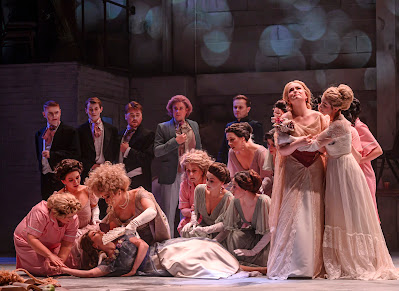Mary McCabe plays the overthinking, romantic Tatyana who pours out her heart before accepting Onégin’s harsh response. The talented Downpatrick soprano finally makes her operatic principal mainstage debut in this production and sustains a sense of inner anguish during the elongated ‘letter aria’ in Act One (assisted by the complementary acting of her older self). But it’s the final scene between Tatyana and Onégin that really brings out McCabe’s fieriness and passionate presence. Her mature performance on opening night was rewarded with sustained applause from an appreciative home audience.
Sarah Richmond has great fun with the role of the older and sometimes maligned sister Olga, with playful shoulder shrugs before Onégin’s misbehaviour complicates her life. Another two Northern Ireland mezzo-sopranos play Madame Larina (Carolyn Dobbin) who is mum to Olga and Tatyana, and nanny Filipevna (Jenny Bourke) who was married off at age 13.Niall McKeever’s set is cryptic. Part barn, part warehouse, part care home, part stately home. It’s a canvass onto which McKeever can project black and white video imagery to heighten the sense of rural living, parties and snow (which works the least effectively). Tube lighting hangs overhead. One fitting descends to become a seat … and teases that it might become a swing (but doesn’t). Without any forced perspective, some of the set’s structural beams hide the recessed doors for some sections of the audience, leaving lighting designer Kevin Treacy to indicate when they open using sunshine and shadows.
Down in the pit, the Ulster Orchestra are absent and NI Opera have assembled their own orchestra for this production, under the baton of Dominic Limburg. Gillian Lennox dexterous use of colour palettes particularly pays off in Act Two when an unexpectedly spritely crowd-pleasing French crooner (Monsieur Triquet played by Aaron O’Hare) – a long-haired dandy with more than a whiff of former MP Michael Fabricant – arrives at the party to sing to Tatyana surrounded by a pastel-dressed chorus. Tatyana’s white fur hat in Act Three is another visual success.Director Cameron Menzies doesn’t shy away from bold creative decisions and has been longing to stage this opera for some time. But the production risks a number of artistic compromises. The doting Tatyana is dressed in relatively modern slacks, yet her reminisces involve people dressed in a style from well before her birth. When peasants arrive to celebrate the harvest they are wearing fabulously sinister, oversized masks and carrying enormous pitchforks. The visuals are fantastic, but feel completely at odds with everything else in the opera, perhaps only working if seen through the eyes of older Tatyana’s senility. A sung line about “coming indoors” when Lensky and Onégin are already standing in the middle of the room also momentarily falls flat.“Why’s it not called Tatyana?” asked one audience member leaving the theatre to walk up Great Victoria Street. That’ll be a matter of nineteenth century male creative sensibilities. Despite the title, the heroine did deservedly get top billing in the (anarchic) curtain call(s), and while the title and the story aren’t well known outside operatic circles, it was pleasing to see a production which could showcase so much local talent: not just the four leading ladies, but also casting baritones Matthew Jeffrey and Seamus Brady in named roles.
The interval comes after the best part of 90 minutes, with a shorter second half. Starting at 30 minutes earlier at 7pm and sticking to the old-fashioned but original seven scenes over three acts format with two intervals would have some merit.
Staging an opera is a huge enterprise, with larger sets, more intricate costumes and wigs, more musicians, longer run times, bigger casts to corral, and a very small number of performances to bed everything in. Ambitions are set high and NI Opera once again have pulled off a memorable production. But there’s still room for the intimate affairs of the heart to explode more fully onto the stage in true operatic style.
Eugene Onégin is back in the Grand Opera House with performances on Thuesday 17, Thursday 19 and Saturday 21 September.
Photo credit: Neil Harrison
Appreciated this review? Why not click on the Buy Me a Tea button!






No comments:
Post a Comment